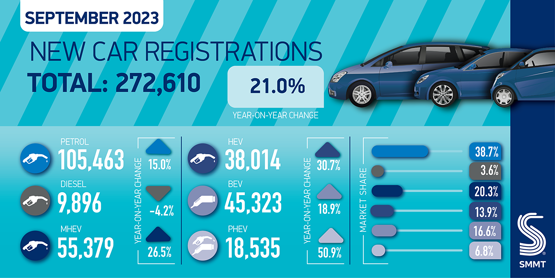September sees return of industry momentum: private car sales up 21%, fleet’s 41% uplift driving growth
The traditional September plate-change bonanza saw private car sales grow 21% – the industry’s best September since 2020 – according to the latest figures from the Society of Motor Manufacturers and Traders (SMMT).
The 272,610 September registrations by private buyers were however outshone by fleet sales which rose 40.8% to 143,256 cars to take a market share of 52.5%, reflecting a market rebalancing following a constrained supply pipeline last year.
Combined, September marked the 14th consecutive month of growth despite challenging economic conditions with registrations 20.6% below pre-pandemic levels.
Electric vehicle uptake continued to grow in the month, with plug-in hybrid vehicles (PHEVs) up 50.9% to take a 6.8% market share and hybrid electric vehicles (HEVs) up 30.7% to account for 13.9% of all registrations.
Battery electric vehicles (BEVs), meanwhile, recorded their 41st consecutive month of growth – with 45,323 drivers making the switch, an 18.9% uplift. Given this growth was less than the overall recorded by the market, however, BEV market share slipped back slightly to 16.6% from 16.9% a year ago.
There are now 238,544 registered BEVs on the road in 2023 compared to the 175,614 at the same point last year, a 35.8% increase. With sales of electric growing, diesel fell from 10,330 units to 9,896 (-4.2%), although petrol has risen from 91,679 units to 105,463 units (15%).
BEV volume increases were driven by fleet purchases, which rose by 50.6% driven by advanced technology, performance, reduced environmental impact and tax incentives.
Private BEV registrations fell 14.3% however with less than one in 10 private new car buyers opting for electric in September. The SMMT said the decline here underlines the importance of providing purchase incentives and other mechanisms to stimulate demand.
It added that despite an end of sale date now aligned with other major markets, the UK still has the most challenging zero emission vehicle (ZEV) transition timeline. The recently published Zero Emission Vehicle Mandate requires ZEVs to comprise half of each manufacturer’s new registrations within five years, and 80% by 2030.
Mike Hawes, SMMT chief executive, said: “A bumper September means the new car market remains strong despite economic challenges. However, with tougher EV targets for manufacturers coming into force next year, we need to accelerate the transition, encouraging all motorists to make the switch.
“This means adding carrots to the stick – creating private purchase incentives aligned with business benefits, equalising on-street charging VAT with off-street domestic rates and mandating chargepoint rollout in line with how electric vehicle sales are now to be dictated. The forthcoming Autumn Statement is the perfect opportunity to create the conditions that will deliver the zero emission mobility essential to our shared net zero ambition.”
Sue Robinson, chief executive of the National Franchised Dealers Association (NFDA), added: “Recent policy changes in relation to ULEZ and the sale of new petrol and diesel vehicles has created uncertainty in the industry. In a recent poll, NFDA found that 62% of surveyed dealers are expecting demand for EVs to decrease and 80% feel that the UK Government needs to introduce more price incentives for consumers.”
She pointed out that despite this, franchised dealers are reporting steady footfall at dealerships, with 45% of dealers saying it was at a similar level to the previous month, despite the regulatory upheaval.
Ian Plummer, commercial director of online marketplace Auto Trader, reported that manufacturers are now using price to stimulate EV demand in retail channels now supply issues are resolving.
“Facing the, for some, ambitious Zero Emission Vehicle mandate – which did not change for cars amidst recent announcements – it’s likely that many manufacturers will become even more reliant on using price as a lever as they attempt to stimulate enough demand to reach the government-mandated 22% of new car sales by the end of 2024. Whilst the overall market is at around 16% for 2023 so far, many manufacturers will be further behind and may be forced to buy credits from all-electric new market entrants such as BYD, GWM, Tesla and Polestar or face hefty fines.
Robinson, at the National Franchised Dealers Association noted that: ””September is an important plate change month in the industry and it is positive that new vehicle sales have continued to rise despite the uncertainty created by the UK Government change of policy on EV. In a snap poll to members, 39% of dealers rated their trading performance as good during the month.”

